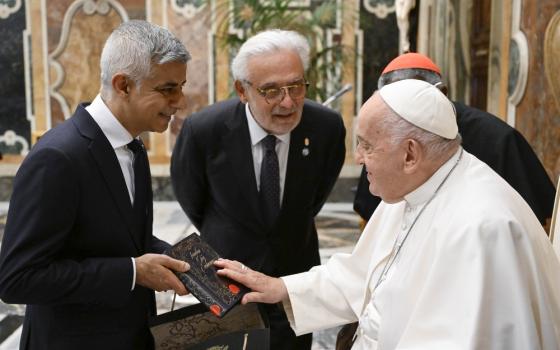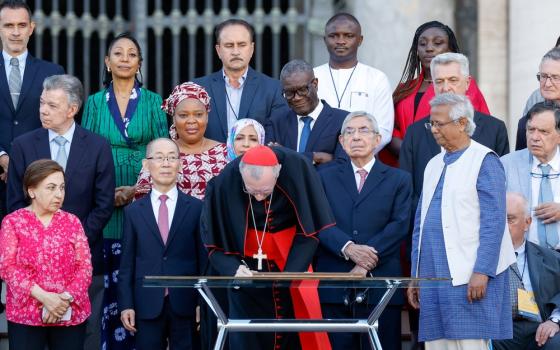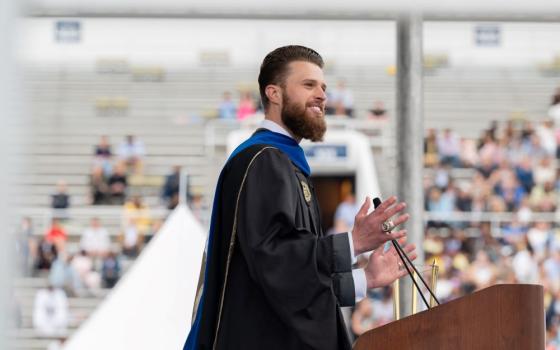
NAIROBI, Kenya -- When 33-year-old Fr. Moses Kago was a teen and considering becoming a priest, he thought that he would have to have surgery to make him a white man.
As he recently recounted that story at his home parish about 60 miles north of Nairobi, he told the congregation members they lived in a different church. He had not seen an African priest; they have seen many.
The Kenyan church, which just 100 years ago was in the early stages of evangelization, is trying hard to stand on its own.
Vocations are flourishing, and many African priests use Pope John Paul II's saying that no one is too poor to give something and no one is too rich to receive. The description on the gate of the secondary school across from Kago's home parish in Mutunguru includes the saying "to mold an all-rounded person who is disciplined, self-reliant ...."
"Encouraging self-reliance of the faithful is one of the priorities of the church," to "wean off the sense of dependence," said Bishop Anthony Muheria of Kitui.
"This idea of self-reliance is catching on," the bishop told American visitors in mid-February.
"We are receiving a lot of help from our sister churches ... but there is also the sense that we must also feel the responsibility to support the church in other areas." He noted a steady growth in contributions "in supporting the church in other places."
"It's very easy to say we don't have funding, which is true. We are actually working on a very thin budget and many times on a debt. But even then we need to feel solidarity," he said.
When a parish council member in Mutunguru told visitors of all the projects the parish would like funded, he was gently chided by two different priests. Kago indicated he would put resources into people, not projects.
Fr. Celestino Bundi, Kenyan national director of the Pontifical Mission Societies, told parishioners there was no bank or vault that they could unlock to release money.
"The money in your pocket will build the dispensary," he said gently during remarks after Communion.
"We share together as a family," he said, telling people "the little you can give, you give."
"Give to God and God will bless you more," he told them, and later told parish leaders, "We have the capacity to develop ourselves."
Bishop Anthony Ireri Mukobo of Isiolo, chairman of the Kenyan bishops' commission for missions, told Catholic News Service that some Kenyan dioceses can actually send some of their own priests to other parts of the country to help run parishes.
The Archdiocese of Nairobi "can take care of its own internal expenses ... and also personnel," as can the Nyeri Archdiocese and several others.
But in some areas, he said, "This is the first evangelization."
Many areas cannot take care of their own resources yet "because of the natural calamities of the areas," he added.
However, he pointed out, there is no church in the world "in which you can walk by yourself." The Americans are rich in materials, but the Kenyans are rich in vocations, he said.
"We all need -- even the United States," he said.
Kenyan church leaders are free with their praise of Catholic missionaries who began the most current evangelization in the late 19th century. U.S. Maryknoll Fathers and Brothers have worked in East Africa since 1946.
"Our mission was to establish the local church," said Maryknoll Fr. Joseph Healey, 72. "The local church is on its own now, but we are accompanying the local church."
"We handed over a well-oiled enterprise," said Maryknoll Fr. John Conway, 80. He said when missionaries first came to Kenya, the idea was to implant the church in an area where it did not exist.
"We're a different engine now," he said. "There is a place for mission, but it's highly specialized."
Maryknoll has turned over to the Kenyans the churches and buildings it has built. The order provided the Kenyans with equipment, a bank account -- "it was a going operation," Conway said.
Other orders that work in Kenya also recruit vocations from the country and are more settled there.
Nairobi Cardinal John Njue, chairman of the Kenya Episcopal Conference, said the church recognizes the "growth and the sacrifices of missionaries."
"The seed has been planted; if the seed has been planted, then now it is (our) responsibility to make sure that it is watered and, indeed, that it is properly weeded so that then it can be able to grow and that we, too, can be able to leave meaningful heritage to future generations," he said in mid-February.
To ensure the church grows, "we are really trying to see that every category" of Catholics is animated and encouraged, he said, but the job is not without challenges, such as secularism. For instance, he said, the church has good programs for children, but as they grow into older teens, the church starts to lose them.
"Our faith is a heritage, and we cannot just play around with it," he said. "We must move on."








